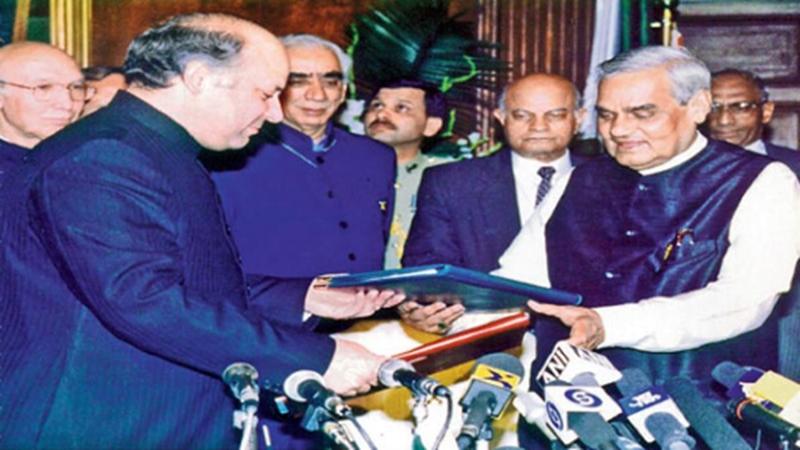Published 21:12 IST, May 28th 2024
Nawaz Sharif's Big Confession: Pak Violated Lahore Agreement in 1999
Sharif and Vajpayee signed the Lahore Declaration on February 21, 1999, after a historic summit.

Lahore: Amidst strained India-Pakistan relations, former Pakistan Prime Minister Nawaz Sharif confessed that Islamabad had breached a pact with India, which he and his former counterpart Late Atal Bihari Vajpayee had signed in 1999. He made the statement in an apparent reference to the Kargil misadventure by Gen Pervez Musharraf. Musharraf was considered the main architect of the Kargil War that took place months after Sharif signed the historic peace accord with Vajpayee in Lahore.
"On May 28, 1998, Pakistan carried out five nuclear tests. After that Vajpayee Saheb came here and made an agreement with us. But we violated that agreement...it was our fault," Sharif told a meeting of the PML-N general council that elected him president of the ruling party six years after he was disqualified by the Supreme Court. Pakistan's military has not reacted to Sharif’s statement until the filing of this report.
Lahore Declaration
Sharif and Vajpayee signed the Lahore Declaration on February 21, 1999, after a historic summit. The agreement that talked about a vision of peace and stability between the two countries signalled a major breakthrough, but a few months later Pakistani intrusion in the Kargil district in Jammu and Kashmir led to the Kargil War.
The declaration outlined a mutual vision of peace and stability between India and Pakistan, signalling a potential thaw in relations between the two nuclear-armed neighbours. However, the optimism was short-lived. Just a few months later, Pakistani forces infiltrated the Kargil district in Jammu and Kashmir, leading to the Kargil War, a significant military conflict that escalated tensions and resulted in numerous casualties on both sides.
Sharif’s statement comes at a time when bilateral relations between India and Pakistan have hit new lows, especially following the Pulwama attack in February 2019. Both nations have since downgraded their diplomatic missions, adding to the strained atmosphere.
Sharif's acknowledgement of Pakistan's role in violating the Lahore Declaration is particularly significant given the longstanding controversy surrounding the Kargil conflict.
A 2004 book, "Pakistan's Drift into Extremism: Allah, the Army, and America's War on Terror" by Hassan Abbas, sheds light on the internal dynamics of Pakistan's decision-making during that period. Abbas, a former senior police officer who served under both Prime Minister Benazir Bhutto and President Pervez Musharraf, suggests that Sharif was not aware of the Kargil operation when he hosted Vajpayee in Lahore on February 20, 1999.
The book, which explores the rise of religious extremism in Pakistan, includes a foreword by Jessica Stern and provides new historical insights into various critical events, including the 1965 war, General Zia-ul-Haq's plane crash, a botched military coup in 1993-94, the story of the National Accountability Bureau, and Musharraf's response to the 9/11 terrorist attacks.
One of the more startling revelations in Abbas's work is the extent to which the Kargil operation was kept under wraps. According to Abbas, even high-ranking military officials, including corps commanders and other service chiefs, were excluded from the decision-making process. Pakistan's then High Commissioner to Britain, Maleeha Lodhi, is quoted as saying that "even the very able Director-General Military Operations (DGMO), Lt-Gen Tauqir Zia, was initiated into the secret after the 'gang of four' had already taken the irrevocable decision of going ahead with the operation."
Sharif's candid admission has reignited discussions about the Kargil War and its ramifications on Indo-Pak relations. The conflict, which lasted from May to July 1999, resulted in significant casualties, with official Indian figures stating that 527 Indian soldiers were killed and 1,363 wounded, while Pakistan's official figures are less clear but estimated to be in the hundreds. The conflict ended with Indian forces recapturing most of the territory occupied by Pakistani troops and militants, and intense international diplomatic pressure, particularly from the United States, led to the withdrawal of remaining Pakistani forces.
Updated 21:40 IST, May 28th 2024




